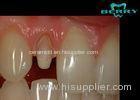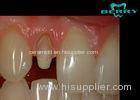FDA Ceramic Dental Crowns Restoration Good Biocompatibility
A crown is a restoration that covers or caps a tooth, restoring it to its normal size and shape while strengthening it and improving its appearance. Crowns are necessary when the tooth is broken down to the point where a filling won't be effective.
A crown can be used to:
- Hold a cracked tooth together to prevent further damage
- Cover and support a tooth with a large filling where only a little of the original tooth is left
- Attach a bridge
- Protect a weak tooth from breaking
- Restore a broken tooth
- Cover a discolored or misshapen tooth
- Cover a dental implant
What is the procedure like?
Before we put in a crown, we first have to prepare your tooth. We will remove part of the tooth so the crown can fit in securely and comfortably. The area around your tooth will be numbed throughout the procedure with a local anesthetic.
After the tooth is prepared, we will make an impression of your teeth and gums using a paste or putty. This will be sent to a laboratory to make your custom crown. This usually takes 2 to 3 weeks. You will be given a temporary crown until your permanent crown is ready.
Finally, the temporary crown is removed and the new one is cemented onto the tooth.
What are the different types of crowns available?
There are several different methods of crown restoration, each using a different crown material.
- Metal crowns are made entirely of a metal alloy that may include gold, platinum, palladium, or other elements. Compared with other kinds of crowns, metal crowns preserve more of the tooth structure. They withstand biting and chewing forces well and rarely chip or break. The biggest drawback of metal crowns is the metallic color.
- Porcelain-fused-to-metal (PFM) crowns can be color-matched to your teeth. Second only to all-ceramic crowns in appearance, porcelain-fused-to-metal crowns look like normal teeth. However, the metal underlying the crown’s porcelain can create a dark line. PFM crowns tend to wear down opposing teeth more than metal crowns. The crown's porcelain portion can also chip or break.
- All-resin crowns are the least expensive type of crown. The drawback is that they are more prone to chips and fractures than other crowns and tend to wear down over time.
- All-ceramic or all-porcelain crowns provide the best natural color of all the crowns. They are not as strong as PFM or gold crowns, and they may wear down opposing teeth more than metal or resin crowns. Because they are the most cosmetically pleasing, they are usually used for the front teeth.
What are the potential problems patients may experience after getting a crown?
You may experience increased sensitivity immediately after the procedure, particularly if the crowned tooth still has a nerve in it. For sensitivity to heat and cold, you may want to try toothpaste for sensitive teeth. Pain or sensitivity from biting down usually means that the crown is too high on the tooth. If this is the case, we will be able to fix the problem.
Porcelain crowns may chip. Resin can be used to repair the remaining crown. If the chipping is extensive, the entire crown may need to be replaced.
Crowns sometimes become loose if the cement washes out from underneath. Bacteria can then leak in and cause decay. If your crown feels loose, contact our office.
In some cases, a crown may fall off entirely. If this happens, contact us immediately so we can walk you through the proper maintenance of your teeth and crown until you are able to come in for an appointment. We may be able to replace the crown; if not, a new crown will be made.
Dental Implants
Dental implants provide a foundation for replacement teeth that look, feel, and function just like natural teeth. No more need to deal with uncomfortable dentures or bridges—with permanent dental implants, a person who has lost teeth regains the ability to eat and smile with effortless confidence.
Dental implants are surgically implanted in the jaw to provide a comfortable, secure fit and a natural look. Implants can support replacements for one tooth, several teeth, or even all of the teeth. Dental implants deliver outstanding results in both appearance and function of the new teeth.
Why do I need a dental implant?
The healthiest thing to do when you lose a tooth is to have it replaced. Otherwise, you risk problems with biting, chewing and speaking, headaches, muscle pain and an unattractive appearance. Dental implants provide a comfortable, secure, natural-looking solution for tooth replacement to retain function and aesthetics and preserve bone structure.
Dental implants serve as the base for many tooth-replacement options, including bridges, dentures and individual artificial teeth. Implants also help preserve facial structure, preventing the bone deterioration that occurs when teeth are missing.
How do dental implants work?
The dental implants themselves are titanium cylinders that are surgically implanted in the jawbone where the missing teeth were rooted. Over time, the titanium bonds with the bone, creating a strong foundation for artificial teeth.
Small posts are then attached to the implant. Protruding through the gums, these posts provide stable anchors for artificial replacement teeth.
How long does the dental implantation process take?
Dental implants are placed during several appointments over many months. In the first one or two appointments, the titanium posts or anchors are implanted in the jaw. These anchors need at least three to six months to heal. During this time, you will be fitted with dentures or individual false teeth.
Once the implants have healed, the natural-looking replacement teeth, crowns, bridges or dentures are fitted and installed on the posts.
Dental implant surgery may be performed in an office or hospital with local or general anesthesia.
Am I a candidate for dental implants?
The number-one requirement for dental implants is sufficient, strong bone in the area beneath the missing teeth. Without enough bone, the implants will not be able to take hold in the jaw.
If you do not have the bone necessary for dental implants, your dentist may recommend bone grafting—removing bone from elsewhere in the mouth or from the hip, or using artificial bone, and placing it in the jaw until it grows into the natural bone—as a first step in the dental implant process.








